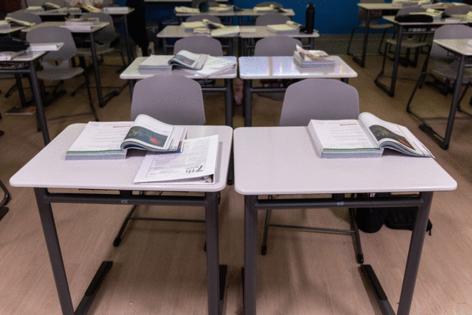Editorial: Illinois pats itself on the back for better student performance -- after lowering education standards
Published in Op Eds
The state of Illinois released new student performance data the day before Halloween, touting better reading and math proficiency and a higher graduation rate.
What state officials didn’t emphasize is that this year’s “improvements” come with a big asterisk. Illinois changed how it defines “proficiency,” lowering the bar for what counts as meeting expectations.
Earlier this year, the Illinois State Board of Education voted to lower the proficiency “cut scores” for the Illinois Assessment of Readiness, the standardized test taken by students in grades 3–8. Officials said the old thresholds were too high and unfair to students.
The new system, they argued, offers a more “realistic” snapshot of how kids are doing. But that change also makes it nearly impossible to compare new scores to previous years. The state’s online Report Card still includes the historical data in a separate area, but what’s being lost is honesty in presentation.
For years, Illinois has struggled to reconcile high academic expectations with persistently low proficiency rates. After the pandemic, scores cratered and never fully rebounded. The new cut scores reflect a broader debate over whether to meet students where they are or to hold firm on rigorous standards. Lowering expectations may make test results look better on paper, but it does nothing to raise real performance.
For parents, these changes aren’t academic — they shape how families understand whether their children are actually on track. A report card should be a clear window into student achievement, not a fogged-up mirror.
And even under the new, easier benchmarks, the picture isn’t rosy.
Many students — especially teens — are still missing too much school. Chronic absenteeism has improved statewide but remains high in high schools, with little change in Chicago. It’s hard to learn if you’re not in class. Attendance and proficiency are linked. Students who miss large portions of the school year fall further behind, especially in math, which builds sequentially. Without consistent attendance, even relaxed standards can’t mask the gaps in mastery that compound year after year.
Just over half of those in grades 3 through 8 met reading standards this year, while fewer than 4 in 10 high schoolers reached proficiency in math on the state’s IAR and ACT exams.
When you take a closer look, you see acute problems among specific demographics.
Boys are far less likely to read at grade-level than girls, for example. And Hispanic and Black students fare much worse than their white and Asian peers. The disparities are a problem that will yield long-term consequences.
Meanwhile, ISBE is celebrating improved proficiency and a graduation rate near 90%. Something doesn’t add up.
We continue to have grave concerns over whether our kids are learning the basics before being shuffled along to the next grade.
These challenges are nothing new, and yet they bear repeating lest they become overlooked in the state’s rush to put a new spin on things. If we aren’t honest, we’re failing our kids.
Illinois deserves credit for making its data public and accessible. But accessibility isn’t the same as honesty. The public deserves a clear explanation that the goalposts have moved — not a misleading victory lap. If state leaders want to celebrate progress, they should first make sure it’s real.
_____
©2025 Chicago Tribune. Visit chicagotribune.com. Distributed by Tribune Content Agency, LLC.
























































Comments